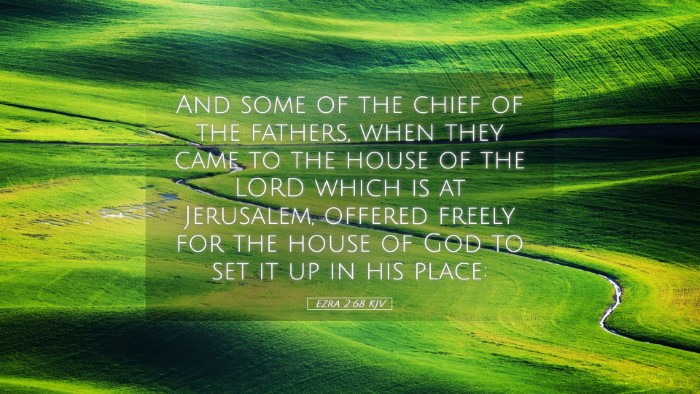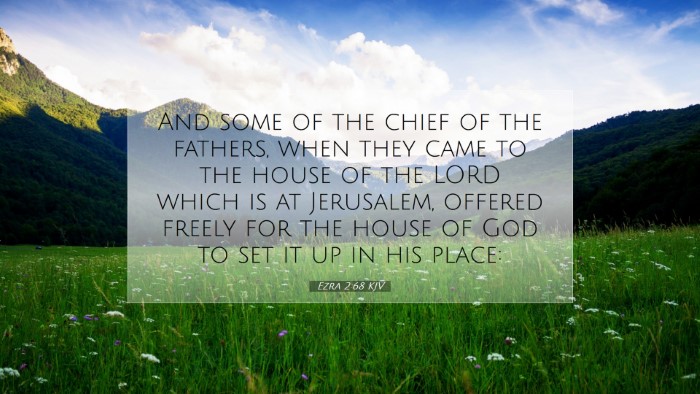Commentary on Ezra 2:68
Verse Context: Ezra 2:68 states, "And some of the chief of the fathers, when they came to the house of the Lord which is at Jerusalem, offered freely for the house of God to set it up in his place." This verse marks a significant moment in the post-exilic community of Israel, showcasing themes of sacrifice, dedication, and communal restoration.
General Overview
The return of the exiles from Babylon marked the beginning of a pivotal restoration period for Israel. Ezra 2:68 reflects the attitude of the chief men who, upon returning, expressed their commitment to re-establishing the temple as the center of worship and community life. This passage highlights the value placed on devotion to God’s house and the willingness to give generously for its restoration.
Insights from Commentaries
Matthew Henry's Commentary
Matthew Henry emphasizes the importance of leadership and collective action in spiritual matters. He observes that "the chief of the fathers" represented the elders and leaders who took responsibility for initiating the rebuilding of the temple. Their voluntary offerings reflect a heart of stewardship and a commitment to God’s work. Henry suggests that their actions were not merely a financial contribution but an act of faith in God's promise of restoration.
Albert Barnes' Notes on the Bible
Albert Barnes expounds on the significance of the offerings made. He notes that the phrase "offered freely" indicates a voluntary response, motivated by gratitude and a desire to please God. Barnes highlights that such acts of generosity were essential in rekindling the spiritual fervor necessary for rebuilding the temple. He asserts that the leaders' willingness to give for the communal cause serves as a model for contemporary believers in their support of church missions and ministries.
Adam Clarke's Commentary
Adam Clarke offers a detailed examination of the cultural and theological implications of the offerings. He notes that these contributions were a fundamental expression of an individual’s relationship with God. Clarke states that the act of giving performed by the chief leaders showcased their vocal support for God's work—highlighting that true worship is often expressed through tangible actions. He encourages readers to consider how our own giving lays the foundation for spiritual renewal within our communities.
Theological Implications
- Leadership and Responsibility: The role of spiritual leaders is crucial in fostering a sense of communal responsibility towards God's mission. This passage challenges leaders today to embody a spirit of service and sacrifice.
- Generosity as Worship: The act of giving for the temple signifies that generosity is a form of worship and devotion. It prompts contemporary believers to evaluate their own giving as an extension of their worship of God.
- Community Involvement: The rebuilding of the temple was a communal effort that required collective engagement. This challenges modern congregations to unite in vision and purpose for their spiritual homes.
Practical Applications
- Assessing Our Contributions: Believers are encouraged to reflect on their contributions to their local church. In what ways can they support their community's vision for advancement and renewal?
- Encouraging Generosity: Pastors and leaders should foster an atmosphere where giving is seen not as an obligation but as an opportunity for blessing and involvement in God’s work.
- Restoring the Focus on Worship: This passage invites churches to rediscover the importance of the gathering of worshippers and the significance of the church as a place dedicated to God.
Conclusion
In summary, Ezra 2:68 is not only a historical account of the returning exiles but also a timeless message about commitment, community, and the importance of a devoted heart in the work of God's kingdom. The insights from Matthew Henry, Albert Barnes, and Adam Clarke collectively remind pastors, students, and scholars of the richness of scripture and its profound implications for today’s church life.


